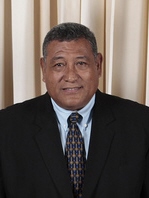Related Research Articles

Tuvalu is an island country in the Polynesian subregion of Oceania in the Pacific Ocean. Its islands are situated about midway between Hawaii and Australia. They lie east-northeast of the Santa Cruz Islands,northeast of Vanuatu,southeast of Nauru,south of Kiribati,west of Tokelau,northwest of Samoa and Wallis and Futuna,and north of Fiji. Tuvalu is composed of three reef islands and six atolls. They are spread out between the latitude of 5°and 10°south and between the longitude of 176°and 180°. They lie west of the International Date Line. Tuvalu has a population of 10,507. The total land area of the islands of Tuvalu is 26 square kilometres (10 sq mi).
The politics of Tuvalu takes place in a framework of a parliamentary representative democratic monarchy,whereby the Monarch is the head of state,represented by the Governor-General,while the Prime Minister is the head of government. Executive power is exercised by the government.

Sir Tomasi Puapua is a political figure who represented Vaitupu in the Parliament of Tuvalu. He attended the Fiji School of Medicine and the Otago University Medical School. He married Riana Puapua.
Sir Toaripi Lauti was a Tuvaluan politician who served as chief minister of the Colony of Tuvalu (1975–78),as the first prime minister following Tuvalu's independence (1978–1981) and governor-general of Tuvalu (1990–1993). He was married to Sualua Tui.
Tuvalu elects a legislature on a national level. The Parliament of Tuvalu has 16 members,elected for a four-year term in 8 double-seat constituencies. Tuvalu is a de facto non-partisan democracy since it does not have political parties.
Sir Fiatau Penitala Teo was a political figure from the Pacific nation of Tuvalu. Teo was appointed Chief in the House of Chiefs of Niutao in 1945 and was reappointed as a Chief on 29 June 1997 after his service as the first Governor General of Tuvalu.
Sir Tomu Malaefone Sione was a political figure from the Pacific nation of Tuvalu. He worked as a journalist from 1962–68,and held the post of radio announcer in the Broadcasting and Information Department of the administration of the Gilbert and Ellice Islands Colony (GEIC). He was the head of the southern Niutao clan. He was married to Segali.

The Parliament of Tuvalu is the unicameral national legislature of Tuvalu. The place at which the parliament sits is called the Vaiaku maneapa. The maneapa on each island is an open meeting place where the chiefs and elders deliberate and make decisions.

Sir Kamuta Latasi is a political figure from the Pacific nation of Tuvalu from Funafuti atoll. He was elected to the Parliament of Tuvalu in 1992. Latasi served as the 4th Prime Minister of Tuvalu from 1993 until 1996. He has served as the Speaker of parliament from 2006 to September 2010 and again from December 2010 to March 2014.

Apisai Ielemia was a Tuvaluan politician. He served as the tenth Prime Minister of Tuvalu from 2006 to 2010,and was returned as a member of parliament in the 2010 Tuvaluan general election. He was re-elected to parliament in the 2015 Tuvaluan general election. On 5 October 2016 Chief Justice Sweeney of the High Court of Tuvalu declared that Ielemia’s parliamentary seat was vacant as he was not qualified to be a member of parliament,as the consequence of the short time the opposition MP served time in jail following his conviction on 6 May 2016 in the Magistrate’s Court of charges of abuse of office during the final year of his term as Prime Minister. The abuse of office charges related to payments deposited into a National Bank of Tuvalu personal account. The 5 October 2016 decision of the Chief Justice was controversial as it appeared to contradict the June 2016 decision of Justice Norman Franzi of the High Court of Tuvalu that had quashed Ielemia’s conviction and acquitted him of the abuse of office charges. The appeal to the High Court held that the conviction was "manifestly unsafe," with the court quashing the 12-month jail term.

Funafuti is an atoll and the capital of the island nation of Tuvalu. It has a population of 6,320 people,making it the country's most populous atoll,with 60.15 per cent of Tuvalu's population. It consists of a narrow sweep of land between 20 and 400 metres wide,encircling a large lagoon 18 km long and 14 km wide. The average depth of the Funafuti lagoon is about 20 fathoms. With a surface area of 275 square kilometres (106.2 sq mi),it is by far the largest lagoon in Tuvalu. The land area of the 33 islets around the atoll of Funafuti totals 2.4 square kilometres (0.9 sq mi);taken together,they constitute less than one per cent of the total area of the atoll. Cargo ships can enter Funafuti's lagoon and dock at the port facilities on Fongafale.
The Cabinet of Tuvalu is the executive branch of the government of Tuvalu.
General elections were held in Tuvalu on 27 August 1977. As there were no political parties,all candidates ran as independents,with Toaripi Lauti remaining Chief Minister. Voter turnout was 78.8%.
General elections were held in Tuvalu on 8 September 1981.
General elections were held in Tuvalu on 26 March 1998. As there were no political parties,all candidates for the 12 seats ran as independents,with seven of the incumbents retaining their seats. Following the election,Bikenibeu Paeniu was re-elected Prime Minister.
The Constitution of Tuvalu states that it is “the supreme law of Tuvalu”and that “all other laws shall be interpreted and applied subject to this Constitution”;it sets out the Principles of the Bill of Rights and the Protection of the Fundamental Rights and Freedoms.
Samuelu Penitala Teo MP is a Tuvaluan politician. He is the son of Sir Fiatau Penitala Teo who was appointed as the first Governor General of Tuvalu (1978–1986) following independence from Great Britain. Samuelu Teo himself served as the Acting Governor-General of Tuvalu from January until 28 September 2021. He had succeeded Acting Governor-General Teniku Talesi Honolulu and remained in office until the Rev. Tofiga Vaevalu Falani was sworn in as the 10th Governor-General in September 2021.
General elections were held in the Gilbert and Ellice Islands on 4 April 1974. All candidates ran as independents.
Henry Faati Naisali,CMG,AO,OBE was a Tuvaluan politician who served as Deputy Prime Minister of Tuvalu (1985-1989),Secretary General of the Pacific Islands Forum (1988-1992) and Pro-Chancellor of The University of the South Pacific (1985-1990). He is notable for co-founding the Tuvalu Trust Fund which lead Tuvalu to achieve greater financial autonomy.
References
- ↑ Who's who in Oceania 1981, p193
- ↑ "The Parliamentarian". General Council of the Commonwealth Parliamentary Association. March 23, 1981 – via Google Books.
- ↑ Isaala, Tito (1983). "Chapter 20, Secession and Independence". In Larcy, Hugh (ed.). Tuvalu: A History. University of the South Pacific/Government of Tuvalu. pp. 175–176.
- ↑ "Tuvalu holding its elections". Pacific Islands Monthly. Vol. 52, no. 8. August 1981. Retrieved 16 October 2021.
- 1 2 "Palamene o Tuvalu (Parliament of Tuvalu)" (PDF). Inter-Parliamentary Union. 1981. Archived from the original (PDF) on 25 August 2012. Retrieved 7 March 2013.
- ↑ "Government of Tuvalu" (PDF). 173 Tuvalu News Sheet. 9 December 1982. Retrieved 19 September 2021.
- ↑ "Tuvalu Elects 12 Members of Parliament". Pacific Islands Report. 27 March 1998. Archived from the original on 6 October 2021. Retrieved 6 October 2021.